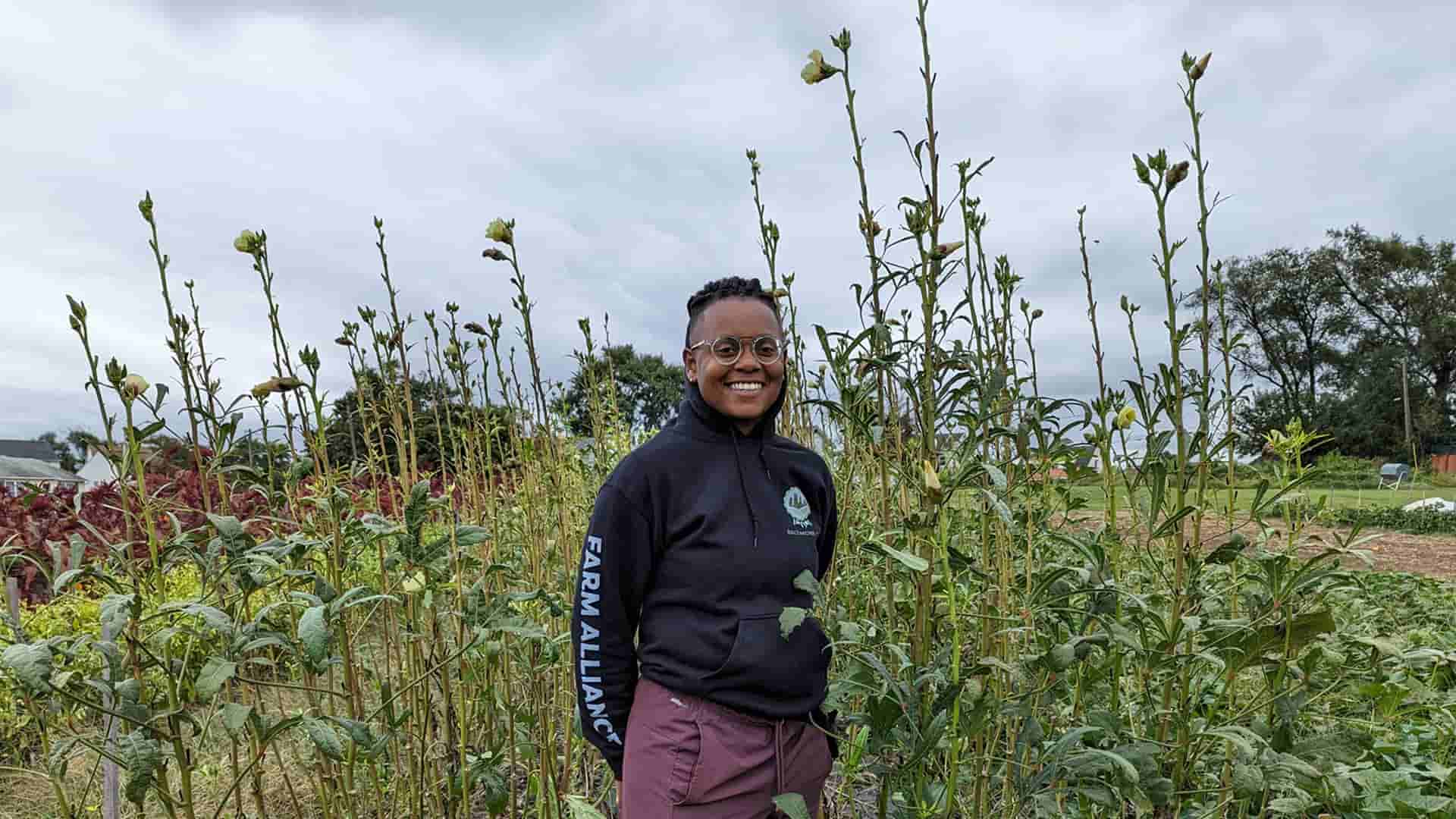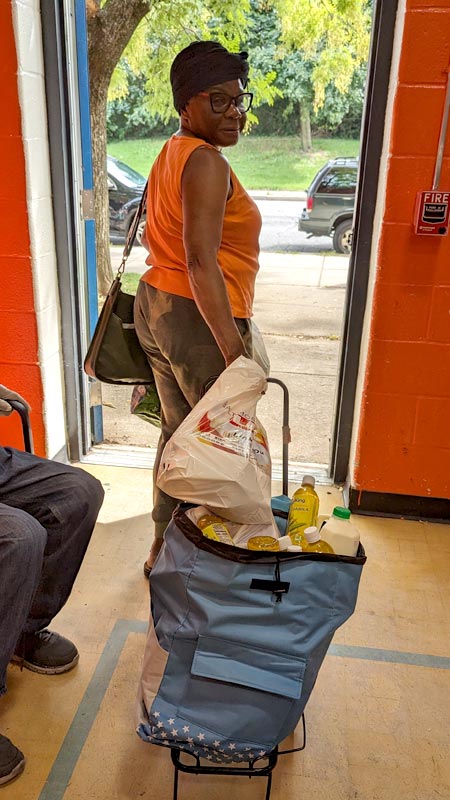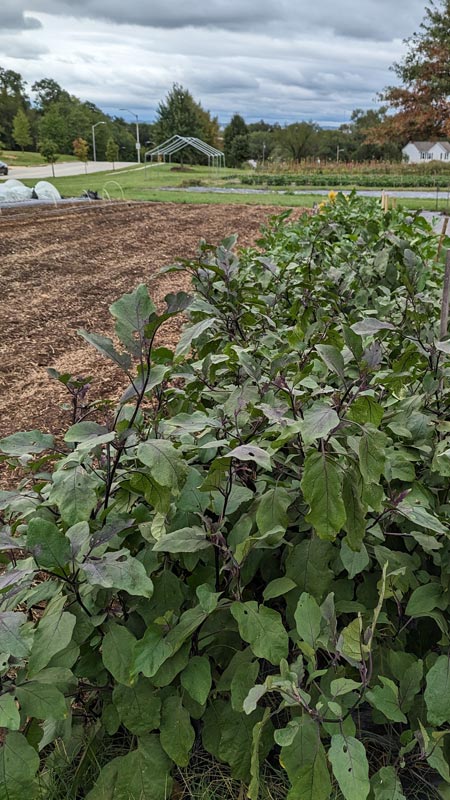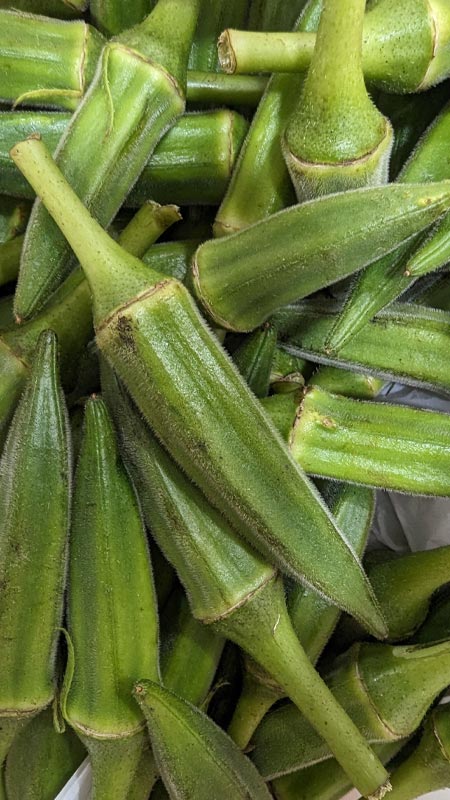Culturally Inclusive Crops Bring Nutrition, Familiarity to Neighbors in Need

On a recent fall Friday afternoon, Daisy K. was one of hundreds of neighbors attending Langston Hughes’ bi-weekly food distribution events in northeast Baltimore.
“I am really shocked, but here it is! I’m gonna’ cut up and steam this callaloo with onion and garlic for 5-10 minutes. Very easy, just like back home in Jamaica,” she said excitedly.
Daisy was referring to some of the produce she picked up at the event, which is run by volunteer Maxine Mabry.
“We have people from the Caribbean, the West Indies, the Bahamas, that tell me how surprised and happy they are that we think about them. And the people that speak other languages, well, I can understand the smiles on their faces!” she shared.

“It can be scary, being in a country you don’t know, trying to find help but not knowing where to go to.”
McKenzie R. attended the event that same day as Daisy, and was just as excited about the produce she received.
“It can be scary, being in a country you don’t know, trying to find help but not knowing where to go to. A neighbor told me about the Langston Hughes Center’s food giveaways, and I am so glad I came by,” she said. “The people are so, so nice, and I never thought I would have found things like these (scotch bonnet) peppers, and callaloo—they will be a big hit with my family.”
Interactions like these are happening more and more often, all across Maryland, thanks to MFB’s Culturally Inclusive Crop (CIC) Program.
With CIC, we’re going further than meeting folks in the middle. We’re deliberately providing neighbors with familiar, culturally relevant foods, to both ease the burden of acquiring fresh produce (which can be prohibitively costly, if it is available at all) and encourage healthier eating choices.

A CIC Timeline
The CIC Program began in the summer of 2021 as a pilot program with the University of Maryland Eastern Shore to provide jute and peppers to local Caribbean families. It quickly expanded to include other Eastern Shore producers, such as Wood Duck Landing Farm, which grows callaloo, eggplant, and habanero peppers, further varying the types of fresh foods we could offer our diverse neighbors.
This year, we’ve been able to expand this impactful program yet again into Baltimore City, where food-insecure Marylanders are now able to access callaloo, okra, and other recognizable foods.
After funding the program ourselves in 2021 and 2022, the increased availability of this specialized produce is thanks to a combination of grants from the State of Maryland, the Maryland Department of Agriculture (MDA), and Feeding America’s Food Security Equity Impact Fund, which supports our interest in backing farmers (and communities) of color, further strengthening our local food system.
The CIC Program is led by MFB Director of Nutrition Kate Long and our Farm to Food Bank Coordinator Amy Cawley.
“In my field, this Culturally Inclusive Crop Program is about as direct as we can be in terms of nutrition and nutrition education. We’re supporting local farms that produce extremely healthy, fresh foods that are culturally familiar and relevant to neighbors who are in unfamiliar territory and facing lots of challenges,” Long explained.
For Cawley, the program accomplishes two important goals:
“From the farmers’ perspective, it is so beneficial to have a market for these different crops. The second part is being able to do more for our neighbors, where they are now. Whether it’s in Baltimore City or on the Eastern Shore, this program gives folks a ‘taste of home,’ so, it’s just a win, win.”
Mercy Court is Living up to its Name
In Northeast Baltimore, Bukola Daramola is making sure the food pantry she runs, Mercy Court, emulates its moniker.
According to Bukola, the local community is very diverse, with 70-80% of the people coming from Haiti, Africa, and Spanish-speaking countries. Many have lost their socio-economic status, and things like communication and transportation are real issues.
“At Mercy Court, we do community outreach to find out what these new migrants need and collaborate with Kate Long to bring in foods people here actually want, things like eggplant, peppers, and leafy greens,” said Bukola.
Working with the Maryland Food Bank is really making a difference in the lives of her neighbors, Bukola added.
“Since we started this program last November, I know that we are making progress here. Our impact has been to make people smile. We can help relieve some of the tension and discordance that comes with hunger, with produce that is sensitive to their culture,” she said.
“At Mercy Court, we do community outreach to find out what these new migrants need and collaborate with Kate Long to bring in foods people here actually want, things like eggplant, peppers, and leafy greens.”
Keeping it Local, Especially for Those who Have Traveled Far
Distributing CIC items is part of the food bank’s larger strategy to help shore up the local food system that bent under the weight of the historic need brought on by the pandemic. We learned that the less we had to rely on distant food sources, the better resource we could be to our neighbors in need.
And while we’re thankful for the businesses that have historically supported our efforts to feed hungry Marylanders, Governor Wes Moore and MDA’s Local Food Purchasing Agreement, signed in April 2023, has accelerated our ability to partner with Maryland-based food producers to get more local product on to the tables of our neighbors.
In Curtis Bay, the Farm Alliance of Baltimore is growing nutrient-dense okra, callaloo, fish peppers for food, as well as indigo and calendula, which are used in traditional garment and food-making methods by some Caribbean cultures.
“It’s important to me to upkeep cultural traditions, and to be inclusive of different cultures. I am growing for the community I serve, which is primarily black and brown people, and they should have food they can identify with,” said Myeasha Taylor, Farm Education and Production Manager with the Farm Alliance of Baltimore.

Continuing to Bridge the Gap East of the Bay
Now in its fourth year, the three farms that helped launch the successful Eastern Shore pilot program continue to supply culturally inclusive crops to Network Partners Rebirth in Salisbury and Aaron’s Place in Denton, which serves large populations of Haitian and Latino families in Caroline County.
According to Aaron’s Place Director Cheryl Beulah, many neighbors served by the pantry are unfamiliar with canned goods, a staple of traditional food assistance.
“So many of the people new to this area are used to their cultural experiences—growing their own food, picking produce form their yards, and cooking it right then. I remember one day trying to teach a 67-year-old woman from Haiti how to use a can opener—to open a can, something she hadn’t seen before,” Beulah explained.
She also describes culturally inclusive crops as more than a food source, but a way of relationship building.
“Some new folks are hesitant when they first reach out, worried that we might ask them for paperwork or something. But when we introduce them to these crops, they say ‘oh, they really do care about us,’ and it helps build trust with them—it’s really making a difference in our relationships here,” she said.
Expanded Inclusivity: The Future of the CIC
Based on feedback from farmers, MFB partners, and most importantly, our neighbors, we’ll continue to find new ways to meet the needs of hungry Marylanders in more intentional ways, including expanding the Culturally Inclusive Crop Program so more people—both the people growing and receiving these specific types of produce—can enjoy better outcomes.
Beyond expanding on the success of the initial pilots by partnering with more organizations like the Around the Bay Farmers Alliance to train more farmers to increase the yield this popular produce, the food bank plans to explore ways to bring culturally inclusive crops to people living in Western Maryland.
“No matter where Marylanders come from, they are Marylanders. We know that access to nutritious food is a basic human right but believe what that really means is that all Marylanders should have the ability to choose culturally appropriate, fresh and healthy foods from a robust local food system, regardless of their background or current circumstances,” MFB’s Kate Long explained.
Get updates on our progress in the fight against hunger
Want to see how your involvement directly impacts the well-being of your neighbors in need? Get the latest news sent to your inbox.







